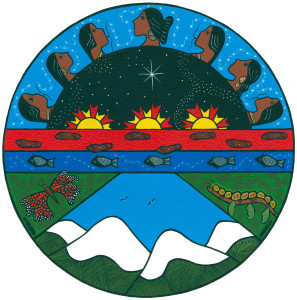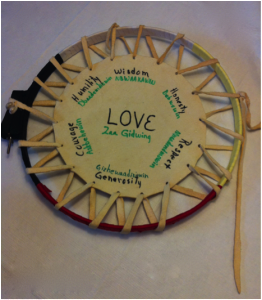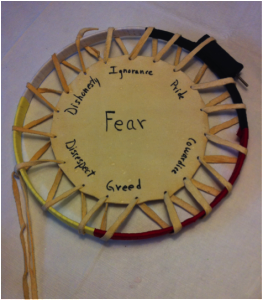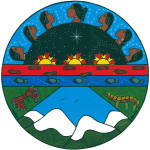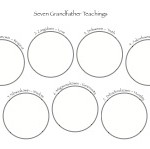The Gifts of the Seven Grandfathers
Origins
Like all cultures that survive many centuries, there is collective knowledge about the meaning of life that is shared from one generation to the next. The Anishinaabeg have many stories about the world and how to best be a part of it. Seven is an important number for many reasons. There were seven stops on the westward migration journey, some petroglyphs depict seven beings in a boat, some constellations have seven stars and there are stories of Seven Grandfathers. The origin of the various teachings is unknown but elders confirm these teachings were originally framed as actions based on what to do in life. The idea of “Seven Grandfathers” as nouns is more recent and may have been a response to the 10 Commandments or 7 Articles of the Constitution. The Anishinaabe philosophy is that through living well, life continues to improve. These words are considered reminders of how to do that. Regardless of how and why they came to be used, they are connected to the concept of minobimaadizi, which is a verb that means someone is living well.
Each one of these concepts can be viewed in five different ways:
- When something is just present in the world without beings making it happen (love is in the universe, truth is beyond beings)
- When a being acts out or exemplifies one of these ideas (I love you, you love me)
- When a being expresses one of these toward a non-being or a part of our universe (you can love the lake, respect the air)
- When a being expresses these toward another being or a part of our universe (this implies a relationship)
- When we talk about any one of these ideas separately as something we might have or not have
The list of Seven Grandfathers here is only one interpretation of Minobimaadizi and it would likely be best for individuals to develop their own set of beliefs and behaviors. Another view of the teachings by Helen Roy Fuhst is available here.
As Principles for Living
Each Grandfather Teaching is a gift the Anishinaabeg carry, a potential tool for living a good life. Our understanding is that as we use these gifts our experience of living improves. Using these gifts in our lives is an ongoing challenge for each of us, requiring attention, discipline and perseverance.

1. Minwaadendamowin – Respect
Chi-apiitenim giwiiji-bimaadizijig, gego dabasenimaaken.
Hold them in great regard your friends (the one you live with), don’t hold them in low regard.
Giminwaadenimaag giwiiji-bimaadizijig.
You think well of your friends.

2. Zaagidiwin – Love
Niinitam inga-zaagi’idiz jibwaa-zaagi’ag awiya bakaanizid
It is my turn, I will love myself before I love somebody who is different
mii dash ji-maajitaayaamba ji-biindiganag bimaadiziwining.
so then I might begin to bring him/her inside (my/this) life.

3. Debwewin – Truth
Ga-ganawaabamidizon awiya jibwa dibaakonad ezhi-bimosed.
You should look at yourself someone before you judge the way he/she walks along.
Gidebwetaanan ina nindan?
Do you believe in these preachings?

4. Aakodewewin – Bravery
Noongwa wii mshkowendamiing miinwaa wii mshkogaabwiiying manjiidig waa zhiwebadagwe.
Right now to hold firm thoughts and strongly stand when you don’t know what will happen.
Hold firm in your thoughts and stand strong even when you don’t know what will happen right now.

5. Nibwaakawin – Wisdom
Nibwaakawin n’ga shkitoon wii gwektaagoziyaanh miinwaa wii minodaapanamaa goya e-kidod.
Wisdom I am able to speak well and to take well (what) someone says.
Wisdom allows me to eloquently and correctly interpret others ideas.

6. Miigwe’aadiziwin – Generosity
Shkitamaawin e-yaaman miinwaa miigwewaadiziwin gdaasawenmaagen.
Ability you have and generosity to disperse to others
You have the ability to give things away and distribute what you have.
Aasagaabwichigewin / Aankenmaagewin / Naakwenmaagewin – Generosity
Standing together / Transferring / Responding to needs

7. Dibaadendiziwin – Humility
Dibaadenim g’wiijibimaadiz waa ezhi wiijsemad.
Be humble you walk with yourself to the way you walk with someone.
Humble yourself to your fellow human in the way you walk with him or her.
Using the Gifts
We use these gifts everyday. They work best when used together. For instance, if Sally asks what you think of her new dress, and you think the color is nice but the shape is awful, you have some choices: You could be untruthful, take the easy way out and say, “It looks great.” That wouldn’t be honest and it wouldn’t be helping her. If she thinks it looks “great” she may wear it when she wants to look really good and be disappointed later. You could also use the Gifts and say, “That color is perfect for you but I think some of your other dresses do more justice to your figure.” In this situation you would use honesty to tell the truth, generosity to tell her the good points of the dress, courage to risk hurting her feelings with the hope of doing less harm than avoiding the truth, respect to be careful of her feelings, humility to think of her needs before your own wish for an easy response, wisdom to see the larger picture, and love to care about how things will unfold for her around the dress.
According to Dominic Eshkakogan, “Each of these teachings must be used with the rest… to leave out one is to embrace the opposite of what that teaching is.”
The Seven Grandfather teachings depicted on a shield:
In Anishinaabe Art Today
The painting “The Circle of Life” by Odawa artist and poet, Zoey Wood Salomon captures the Anishinaabe perspective of cycles in balance, a worldview where the gifts of light, lessons, earth, animals and knowledge are part of one continuum.
Zoey writes, “The people of the fires are symbolized by our seven grandmother/grandfather teachings of love, respect, honesty, bravery, humility, truth, and wisdom. Three fires also remind us to maintain balance in our body, our mind, and our spirit.”
Reflection
Print out the Seven Grandfathers Worksheet (PDF) and for each teaching, draw what it means for you.
How would your drawings have changed over time?
Sources
- Nishinaabe Bimiiadziwin Kinoomaadwinan: Teachings of the Medicine Wheel; Teachings of the Seven Grandfathers, Dominic Eshkakogan
- The shields in the photos were created by Marsha Traxler Reeves under the instruction of Wilma Henry.

